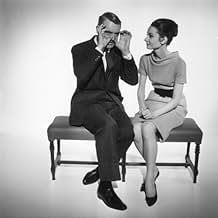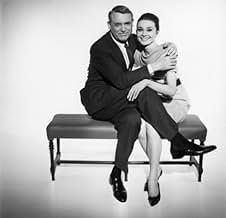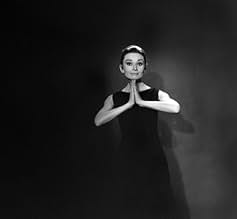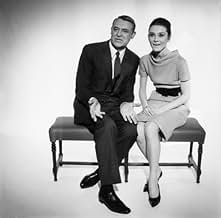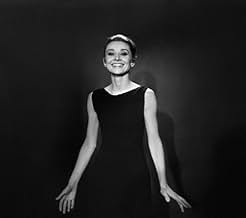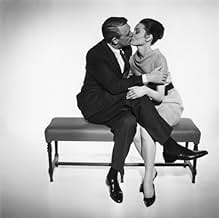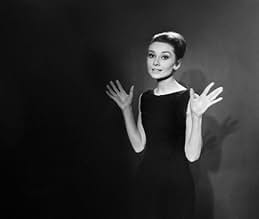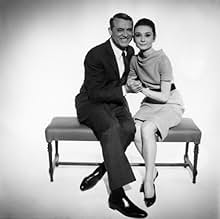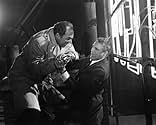Charade
- 1963
- Tous publics
- 1h 53min
Romance et suspense s'ensuivent à Paris alors qu'une femme est poursuivie par plusieurs hommes qui recherchent la fortune volée par son mari assassiné. À qui peut-elle faire confiance?Romance et suspense s'ensuivent à Paris alors qu'une femme est poursuivie par plusieurs hommes qui recherchent la fortune volée par son mari assassiné. À qui peut-elle faire confiance?Romance et suspense s'ensuivent à Paris alors qu'une femme est poursuivie par plusieurs hommes qui recherchent la fortune volée par son mari assassiné. À qui peut-elle faire confiance?
- Réalisation
- Scénario
- Casting principal
- Nommé pour 1 Oscar
- 4 victoires et 9 nominations au total
Marc Arian
- Subway Passenger
- (non crédité)
Claudine Berg
- Maid
- (non crédité)
Marcel Bernier
- Taxi Driver
- (non crédité)
Georges Billy
- Man in Stamp Market
- (non crédité)
Albert Daumergue
- Man in Stamp Market
- (non crédité)
Raoul Delfosse
- Taxi Driver
- (non crédité)
Lucien Desagneaux
- Passer-by in the Public Garden
- (non crédité)
Stanley Donen
- Man in Elevator
- (voix)
- (non crédité)
Avis à la une
Seeing Cary Grand and Audrey Hepburn in 1960s Paris in the lush colour film of the time makes this film worth watching. The setting reminded me a lot of The Pink Panther, also made in 1963.
This, and the chemistry between the leading lady and man make up for a plot which I found contrived, and not particularly credible. The other characters are also not well developed and don't combine very well in the film
Imagine a more light-hearted and Paris-based version of to Catch a Thief, with the mysterious and cool Cary Grant once again beguiling a beautiful and wealthy young woman.
This, and the chemistry between the leading lady and man make up for a plot which I found contrived, and not particularly credible. The other characters are also not well developed and don't combine very well in the film
Imagine a more light-hearted and Paris-based version of to Catch a Thief, with the mysterious and cool Cary Grant once again beguiling a beautiful and wealthy young woman.
"Charade" seems to exist in a parallel universe, where it is not only humanly possible for a man to be as dapper, sexy and urbane as Cary Grant, and a woman to be as chic, adorable and beautiful as Audrey Hepburn, but for them to be a romantic couple, to boot (the mind reels at what the children would look and sound like). Long underrated and underappreciated (and only available in horrible-looking, grainy video prints), this fabulously entertaining comedy-thriller is the cinematic equivilant of a champagne cocktail. Often compared (perhaps unfavorably) to Hitchcock's films of the period, "Charade" contains little of the heavy psychological tension that marked Hitch's work. Instead, the film concentrates on witty banter, Audrey's wardrobe and a clever script--and we're the richer for it. Audrey is a sudden widow who is terrifyingly thrust into a web of deceit; her late husband, it seems, was being hunted by three ex-war buddies with whom he stole $250,000. Audrey, they think, has the money--and if she doesn't come up with it quickly, she'll be joining him. Cary Grant is the handsome, mysterious stranger who may be friend or foe. It had been done before, and it's been done since, but never with such panache. Henry Mancini's stylish score adds immeasurably to both the fun and the tension; and the ever-nimble Stanley Donen directs the suspense scenes just as deftly as the comic ones. My favorites: Audrey trailing Cary dressed "inconspicuously" in a white Givenchy trenchcoat and huge movie star sunglasses, while giving a poor German tourist the fits; Audrey finally cornering Cary in her hotel room and lightly kissing her way down his face--today's filmmakers might take a page from her book: this scene is intensely romantic without ever seeing a bit of exposed flesh or dueling tongues; and of course, the fabulous opening scene (I won't give away the surprise)--with Audrey wearing one of my favorite Movie Star get ups of all time: a hooded mink poncho over a catsuit. This is entertainment with a capital "E", made all the more enjoyable because it never panders to the lowest common denominator, never dips into "camp," and never breaks a sweat. Today's films continue to mine the same territory, and the results are ceaselessly boring, tawdry or both. You can FEEL the strain of the writers and actors as they attempt the kind of slick interplay that came naturally to those involved in "Charade." The beautiful, magnificently restored Criterion DVD edition now allows us to revel in this film like never before.
"I don't bite, you know. Unless it's called for."
"How would you like a spanking?"
A woman on a ski holiday (Audrey Hepburn) talks about getting a divorce, but it turns out she doesn't have to, because her husband has been murdered. Worse yet, three men are now after her because of some money they think she might have gotten from him. They were with her husband behind enemy lines during WWII as part of a covert operation to give a quarter of a million dollars to the French Resistance, but decided to bury the money instead, and dig it up after the war. Another man (Cary Grant) has turned up as well and seems to be her protector, but is he really on her side?
It's a fantastic concept, and as everyone and their grandma has noted, the film is reminiscent of Hitchcock. We see that in its tension, shots like the view from the perspective of a corpse as a morgue drawer closes, and dramatic scenes using the environment, like the fight on the roof behind the giant neon sign, or the chase down in the Paris Metro. Maybe it's also got a bit of Clouzot's Diabolique in a bathtub scene, or just how long the viewer is held in suspense before knowing who the bad guy is.
It's lighter than the average Hitchcock fare and in ways that sometimes border on silliness, but on the other hand, the chemistry between Hepburn and Grant is far greater than anything Hitch ever produced with his obsession over icy blondes. The banter is risqué and Hepburn's come-on's to Grant are steamy, even though Grant's character regularly reminds Hepburn's how much younger she is. This has to be one of my favorite performances from Hepburn, as she ranges from comedy to flirtation to frightened for her life seamlessly. Meanwhile, you have Cary Grant at 59 still getting it done as a debonair romantic lead, and also cutting loose with silly faces, getting into a shower in his suit, and trying his best not to grope women as he plays Pass the Orange with them in a nightclub.
Does it all hold together? Hepburn's character knowing so little about her husband, falling in love again so quickly, or how several characters figure out how the money is hidden? Maybe not completely, but I don't care. It's a rare film that has fantastic moments as a thriller, comedy, and romance, and the star power is through the roof. Besides the leads, the supporting performances from George Kennedy, James Coburn, and Walter Matthau make for a very strong cast. There is depth in other ways as well, e.g. Little moments of humor in places like Matthau asking Hepburn if she knows how much cigarettes cost when she wastes one, or the lovely shot of the reflection of the lights from a boat going down the Seine. Hey, I'd love for the 60's animation style over the opening credits to make a comeback too; between the dead body being tossed from a train and the snazzy graphics, this film hooked me from the beginning. All in all, it's a charming package.
A woman on a ski holiday (Audrey Hepburn) talks about getting a divorce, but it turns out she doesn't have to, because her husband has been murdered. Worse yet, three men are now after her because of some money they think she might have gotten from him. They were with her husband behind enemy lines during WWII as part of a covert operation to give a quarter of a million dollars to the French Resistance, but decided to bury the money instead, and dig it up after the war. Another man (Cary Grant) has turned up as well and seems to be her protector, but is he really on her side?
It's a fantastic concept, and as everyone and their grandma has noted, the film is reminiscent of Hitchcock. We see that in its tension, shots like the view from the perspective of a corpse as a morgue drawer closes, and dramatic scenes using the environment, like the fight on the roof behind the giant neon sign, or the chase down in the Paris Metro. Maybe it's also got a bit of Clouzot's Diabolique in a bathtub scene, or just how long the viewer is held in suspense before knowing who the bad guy is.
It's lighter than the average Hitchcock fare and in ways that sometimes border on silliness, but on the other hand, the chemistry between Hepburn and Grant is far greater than anything Hitch ever produced with his obsession over icy blondes. The banter is risqué and Hepburn's come-on's to Grant are steamy, even though Grant's character regularly reminds Hepburn's how much younger she is. This has to be one of my favorite performances from Hepburn, as she ranges from comedy to flirtation to frightened for her life seamlessly. Meanwhile, you have Cary Grant at 59 still getting it done as a debonair romantic lead, and also cutting loose with silly faces, getting into a shower in his suit, and trying his best not to grope women as he plays Pass the Orange with them in a nightclub.
Does it all hold together? Hepburn's character knowing so little about her husband, falling in love again so quickly, or how several characters figure out how the money is hidden? Maybe not completely, but I don't care. It's a rare film that has fantastic moments as a thriller, comedy, and romance, and the star power is through the roof. Besides the leads, the supporting performances from George Kennedy, James Coburn, and Walter Matthau make for a very strong cast. There is depth in other ways as well, e.g. Little moments of humor in places like Matthau asking Hepburn if she knows how much cigarettes cost when she wastes one, or the lovely shot of the reflection of the lights from a boat going down the Seine. Hey, I'd love for the 60's animation style over the opening credits to make a comeback too; between the dead body being tossed from a train and the snazzy graphics, this film hooked me from the beginning. All in all, it's a charming package.
If you're in the mood for a clever mixture of suspense, romance, humor and some fantastic location shots, treat yourself to CHARADE. Audrey Hepburn was never more appealing than she is here--badly in need of help to discover the whereabouts of the hidden money her late husband's enemies want to find. With her life hanging in the balance, she enlists the aid of Cary Grant--but since all is not what it seems, you're in for some surprising plot twists along a very merry ride.
Just relax and let Cary and Audrey do all the work--with the help of a great supporting cast including Walter Matthau, superb in a surprising supporting role. Stanley Donen keeps it all moving at a brisk pace and Henry Mancini's music is a sheer delight.
Highly recommended as an expert, elegant mixture of humor and suspense, even if it does seem to imitate the Hitchcock way of filmmaking.
Just relax and let Cary and Audrey do all the work--with the help of a great supporting cast including Walter Matthau, superb in a surprising supporting role. Stanley Donen keeps it all moving at a brisk pace and Henry Mancini's music is a sheer delight.
Highly recommended as an expert, elegant mixture of humor and suspense, even if it does seem to imitate the Hitchcock way of filmmaking.
10Ryuji-2
When I first saw "Charade", I was convinced for the longest time this was a Hitchcock movie. Small wonder; Hitchcock all but set the standard for quality mystery films. Still, I give director Donen my sincerest apologies. Anyway, where did this film go?? Its tasteful humor, colorful characters and intelligent plot make "Charade" one of the best mystery movies ever made, but it's not well known even among classic films.
"Look for it. Look as hard and as fast as you can." This film ranks with "Clue", "The Name of the Rose" and "The 39 Steps" as one of the most enjoyable mysteries of all time. Makes a great dating/party movie.
"Look for it. Look as hard and as fast as you can." This film ranks with "Clue", "The Name of the Rose" and "The 39 Steps" as one of the most enjoyable mysteries of all time. Makes a great dating/party movie.
Le saviez-vous
- AnecdotesIt was agreed Cary Grant would keep all of his clothes on when he took a shower, as he was nearly sixty and slightly overweight. However, they then decided the scene was funnier that way.
- GaffesIn the opening scenes when Mrs. Lampert is being shot in the face by the water pistol, the hand holding the pistol is obviously an adult and not a little boy.
- Citations
Reggie Lampert: You're blocking my view.
Peter Joshua: Oh, uh, oh, uh, which view would you prefer?
Reggie Lampert: The one you're blocking.
- Crédits fousDuring the last scene, the screen splits into a checkerboard screens showing Cary Grant and Audrey Hepburn's ending kiss along with Grant's funniest scenes from the movie and "The End".
- Versions alternativesSome prints of the film omit the original music as it is not public domain, unlike the movie itself.
- ConnexionsEdited into 365 days, also known as a Year (2019)
Meilleurs choix
Connectez-vous pour évaluer et suivre la liste de favoris afin de recevoir des recommandations personnalisées
Détails
- Date de sortie
- Pays d’origine
- Sites officiels
- Langues
- Aussi connu sous le nom de
- Charada
- Lieux de tournage
- Hôtel du Mont d'Arbois, Megève, Haute-Savoie, France(First sequence, Swimming-pool)
- Société de production
- Voir plus de crédits d'entreprise sur IMDbPro
Box-office
- Budget
- 3 000 000 $US (estimé)
- Montant brut mondial
- 175 119 $US
- Durée1 heure 53 minutes
- Couleur
- Rapport de forme
- 1.85 : 1
Contribuer à cette page
Suggérer une modification ou ajouter du contenu manquant



